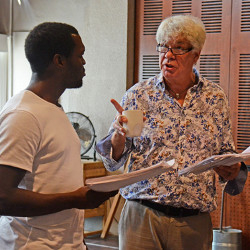Michael Coveney: To Sir With Mixed Feelings, and more Lyric secrecy
Michael Coveney reflects on his own experiences in the classroom and further ponders the critical conundrum posed by Secret Theatre at the Lyric, Hammersmith
Break a leg, they say, but poor old Ansu Kabia, playing the title role in E R Braithwaite's To Sir, With Love (deftly adapted by Ayub Khan Din) at the Theatre Royal, Northampton, has broken an arm instead, and still managed a sterling, steady performance last night at the opening.
By the time I was on the train back to town with Libby Purves of The Times, the Royal & Derngate's press manager, Amanda Howson, had texted us that the author had joined the cast on the stage to share the applause. Nothing too unusual in that, perhaps, except for the fact that the author is 101 years old.

Braithwaite had flown in from Washington to witness the first stage version of his famous novel, best known for the 1967 film starring Sidney Poitier. Less well known, and clarified in this production, is the part played in his story by the extraordinary headmaster of the East End school, Alex Bloom, here called "Mr Florian" and most gracefully played, too, by Matthew Kelly.
Bloom was as progressive a headmaster in his time as was the legendary A S Neill at Bedales School. As Jenny King, one of the show's producers, says in a programme note, he believed that the child, in order to make a contribution to the common good, "must feel that the school community is worthwhile." With Florian's encouragement in the play, this is what Braithwaite claims to have achieved.
What an amazing centenarian he is! I met him briefly before the show, reclining elegantly with his party in a well-cut summer suit, affable and alert, not looking a day over 89. He was raised in colonial British Guyana, served as a fighter pilot in the second world war, studied physics at Cambridge University and, unable to find employment to match his qualifications, worked in Alex Bloom's school throughout the 1950s, before becoming a welfare consultant, a United Nations representative in New York, a diplomat and a professor, as well as writing his books… To Sir, With Love was the first.
The play is about something very important indeed, the value of education in itself, not as a means to another end, or the fulfilment of arbitrarily imposed government guidelines or tests, but as a process in which children achieve dignity and citizenship among each other and in the world beyond. In his first lesson, Braithwaite – whom Kabia, despite the sling, plays with enormous power and presence – scrawls two names on the blackboard: Frederick Chopin and John Keats.
When I worked briefly as a supply teacher in an East End school far less enlightened than Bloom and Braithwaite's, and ten years after them – I'd laboured under the illusion it was the same one, but it wasn't – the main task, especially with Class 3D, was to minimise the number of desks being hurled across the room in a 40-minute lesson period.
But I always found the roughest kids were the brightest, though I misjudged their sense of humour when, tired at last to the back teeth with the antics of an impish little rogue called Wearing, I compelled him to write out one hundred times, "Wearing by name and wearing by nature." I never managed to get my class to the Victoria and Albert Museum, as Braithwaite does, but I did manage to scrawl a few names on the blackboard (and not just Wearing's) and talk about books, poems and plays.
"Pass it on boys, pass it on" says Hector in The History Boys. "Keep it quiet, boys, keep it quiet," replies Sean Holmes at the Lyric, Hammersmith, where the "Secret Theatre" season has opened, as already reported, with A Streetcar Named Desire.
I was intrigued to see that when Mark Shenton tweeted this info in the interval on Monday night, he caused a twitter storm of outrage. This is so ridiculous, as if the only way an audience could possibly engage with Holmes' production as he wants them to – that in itself is a position of unusual, and I'd say uncharacteristic, arrogance on his part – is to be ignorant of Tennessee Williams.
I haven't seen any other reviews except that of Henry Hitchings in the Evening Standard, who meekly follows a non-existing directive of not mentioning the play at all. He may as well have reviewed a paper bag.












